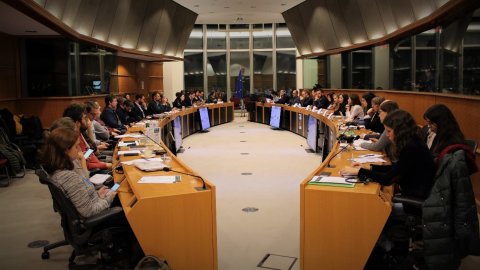On December 9th, AFINET held its Parliamentary Session in Brussels. Nearly 60 people attended the conference “Agroforestry knowledge-based innovation: bringing scientists and practitioners together”.
The event was hosted by MEP Isabel Carvalhais. Rosa Mosquera, the coordinator of the project, presented the results of the project and there was a round table moderated by Anastasia Pantera from the Agricultural University of Athens. Speakers were Michal Wiezik, Member of the European Parliament; Inge Van Oost from the DG AGRI, and farmers Claudia Consalvo and Judit Csikvári.
Over the session, benefits from agroforestry were highlighted by the panelists. MEP Isabel Carvalhais underline some of them such as climate-change mitigation, carbon sequestration, biodiversity and protection of traditional agricultural practices. For her, “speaking about agroforestry is speaking about the future”.
According to Claudia Consalvo, an Italian farmer and also a member of the AFINET consortium, “cooperation is the key for promoting agroforestry”. In the same vein, Inge Van Oost remarked on the importance of Operational Groups and Thematic Networks as AFINET. These projects are about co-creating knowledge, a brand new approach to how research is conceived.
Agroforestry is sometimes about going back to the traditional systems, as MEP Michal Wiezik pointed out, so dissemination of practices and knowledge sharing are also essential for promoting agriculture. Along these lines, panellist agreed that extension services play a key role in this matter, as they should be making the results of research projects such as AFINET understandable and accessible to farmers.
The future of the CAP and policy were also discussed by the experts. They agree that this is an important moment to find a new paradigm for agriculture, and agroforestry systems would be there in this vision of the future. However, trees are still seen as problematic for agricultural land in the proposal for the new CAP. “Subsidies are there”, Judit Csikvári says, “we just don’t fit the boxes”.
As a conclusion, host Isabel Carvalhais highlighted the importance of research and knowledge sharing to better understand agroforestry, but also the need of education and training to recover and promote traditional practices that work. In words of moderator Anastasia Pantera, “nature is speaking and we should be listening”.












